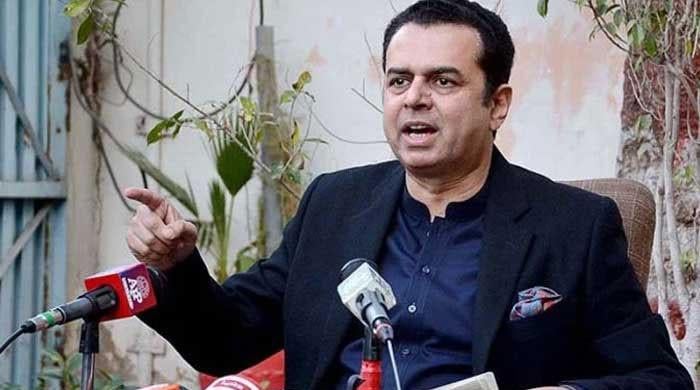Provincial Action Plan: KP to give civil administration lead role in fight against terror
Comprehensive database of terrorists, facilitators to be established; CTD's capacity to also be enhanced
March 26, 2025

- KP to bring legal reforms, administrative measures to counter terror.
- Action plan outlines 84 specific actions across 18 thematic areas.
- Centralised intelligence collection, sharing system to be developed.
PESHAWAR: The Khyber Pakhtunkhwa government has finalised the Provincial Action Plan giving the civil administration a lead role in counterterrorism efforts, The News reported on Wednesday.
As per a communique of a key meeting relating to the province's law and order situation chaired by KP Chief Minister Ali Amin Gandapur, the action plan was structured around seven key pillars including counterterrorism measures, political and social initiatives, legal reforms, good governance, general administrative measures, monitoring, and public awareness campaigns.
The KP's move comes against the backdrop of increased terrorist attacks in the country with the the province emerging as the worst-affected province, according to data released by the Pakistan Institute for Conflict and Security Studies (PICSS).
In KP's settled districts, militants carried out 27 attacks, resulting in 19 fatalities, including 11 security personnel, six civilians, and two militants.
The tribal districts of KP (erstwhile Fata) witnessed 19 attacks, leading to 46 deaths, including 13 security personnel, eight civilians, and 25 militants.
Aiming to address this, the Provincial Action Plan outlines 84 specific actions across 18 thematic areas and assigns responsibilities to relevant provincial departments and federal agencies with defined timelines.
The key features of the action plan included strengthening the state’s authority, restoring public confidence in the system through visible action against terrorists, continuation of kinetic operations against terrorists, strict enforcement of counterterrorism laws, improving public service delivery and incorporating community input in security and development matters.
A comprehensive database of terrorists and their facilitators would be established, regular updates to Schedule IV and strict surveillance of individuals on the list and monthly reviews of bounty cases on wanted terrorists will be carried out. Strict disciplinary action will be taken against government employees found facilitating the terrorists.
Also, fast-track capacity enhancement of police and the Counter-Terrorism Department (CTD), including new recruitment, training, and procurement of modern weapons and equipment is part of the plan action.
Priority projects for police infrastructure in southern and merged districts will be included in the Annual Development Programme.
Furthermore, the action plan emphasises the formulation of a policy to counter cross-border terrorism. A provincial delegation, followed by the approval of terms of reference (TORs) by the federal government, will engage with Afghan tribal elders for negotiations. The federal government will be urged to enhance diplomatic engagement with Afghanistan.
Legal reforms, socio-economic domain
A centralised intelligence collection and sharing system will be developed, integrating local intelligence databases with provincial and federal agencies. Regular meetings of Apex Committee, Steering Committee, and Intelligence Coordination Committees at the divisional and district levels.
Public Liaison Committees at police station levels will be constituted to enhance community oversight of security threats. Action will be taken against illegal spectrum being used as funding sources for terrorism activities including smuggling of narcotics and weapons, etc.
Meanwhile, to curb the smuggling of illegal items, advanced scanners and AI-based monitoring systems at transit points will be installed. Similarly, profiling of non-custom-paid (NCP) vehicles will be completed by 1st August 2025, with GPS tracking for their movements. Moreover, audits of madrassas receiving foreign funding will be carried out to ensure transparency.
Additionally, digital tracking of chemical substances used in explosives, blockchain-based monitoring of explosive material transportation, collaboration with the National Database and Registration Authority for oversight of explosive dealers, upgrading of arms licensing software to regulate weapons sales, electronic cargo tracking system for smuggled goods and joint check posts at key smuggling routes are some of the main points of implementation.
Under the socio-economic domain, key measures to be taken under the action plan include, job creation and alternative livelihoods for youth in terrorism-affected areas, skill development and vocational training to integrate youth into industries, District Economic Plans for merged districts, accelerating economic zone development, Promotion of high-value alternate cash crops in merged districts with financial incentives for farmers.
The action plan also features resettlement plans for temporarily displaced populations of merged areas ensuring basic amenities in their hometowns.
Legal reforms for effective counterterrorism include the strengthening of the legal framework by reviving the Preventive Magistracy System, formulation of a coordinated system between police, judiciary, and district administration, strengthening the Alternative Dispute Resolution (ADR) mechanism, enactment of the KP Enforcement and Regulation Act, reforms in the criminal justice system, including special trials for terrorists in anti-terrorism courts, increasing prosecution staff in anti-terrorism courts as needed, and establishment of faceless courts for security-sensitive trials.
As another important pillar of the action plan, public awareness and communication strategy is to be chalked out with the aim of developing a counter-narrative and informing and educating the citizens about government efforts in counterterrorism and development initiatives.
Regular security reviews at the district level to assess risks propose countermeasures, developing political consensus on counterterrorism strategies and security measures are also the key features of the action plan.
The action plan also features a robust monitoring mechanism with oversight responsibilities assigned to the CM's Secretariat, Chief Secretary’s Office, Home Department, and relevant administrative secretaries.









